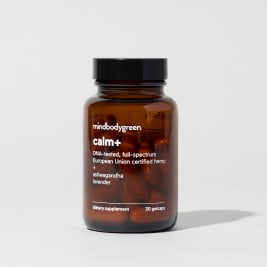Doing This 5-Minute Practice Daily May Help Reduce Alzheimer’s Risk
Here's how to get started today.


mbg Health Contributor
mbg Health Contributor
Jenny is a San Francisco-based mbg contributor, content designer, and climate & sustainability communications specialist. She is a graduate of the University of California Santa Barbara. An avid open-water swimmer, Jenny has worked for healthy living and nutrition brands like Sun Basket, Gather Around Nutrition, and Territory Foods.
Image by Guille Faingold / Stocksy March 31, 2023 With over 6 million Americans living with Alzheimer’s disease (AD), identifying its causes and finding a cure remains a high priority for researchers and doctors. AD is also top of mind for anyone thinking about how to build a lifestyle focused on longevity and the prevention of neurodegenerative diseases. In a new study1 out of the University of Southern California, researchers showed how our nervous system may play a part in the development of AD and what we might be able to do to influence it.
Advertisement
This ad is displayed using third party content and we do not control its accessibility features.
A balancing act
To keep us happy and healthy, our bodies need to keep our sympathetic (think fight or flight) and parasympathetic (think rest and relaxation) nervous systems in balance. But as you’re likely well aware, the stressors of modern-day life, as well as the fact that we can’t physically run from many of our problems like our ancestors could, means the systems’ balance can get out of whack.
Earlier studies suggest that high levels of certain biomarkers (plasma Αβ40, Αβ42, total tau) in our blood indicate not only an imbalance in our system but also a higher likelihood of developing diseases such as Alzheimer’s.
This new study looked at whether those biomarkers could be altered by intentionally increasing or decreasing heart rate variability (HRV)—the amount of time between heartbeats. Its findings suggest that intentional, slow-paced breathing (about 10-second paced) could increase HRV and reduce those biomarkers.
To recap:
Advertisement
This ad is displayed using third party content and we do not control its accessibility features.
It’s important to keep in mind that this study, while the first of its kind, noted several limitations and was based on quite a few assumptions. While it marks a promising first step toward understanding these system interactions, the study authors recommend further research to reaffirm its findings.
Thankfully, regardless of its potential effect on AD, breathwork is quick, free, largely side-effect-free, and associated with a wealth of benefits.
Incorporating breathwork into your routine
Breathwork can improve many factors that influence your overall well-being, from your skin to your mood to your stress levels. Here are a few breathing routines that can help bring your nervous system into balance:
Advertisement
This ad is displayed using third party content and we do not control its accessibility features.
While participants in this study did breathwork for 20 to 40 minutes daily, many studies show you can achieve various benefits from just five minutes. That means you could have a new healthy habit to occupy you while you wait for your morning coffee to brew, ride the bus to work, or enjoy those last precious minutes of your lunch break.
Other steps to reduce your Alzheimer’s risk
If you’re interested in taking steps to reduce your risk of developing Alzheimer’s, you’re not alone. Science is making small breakthroughs every day and learning what we can do to optimize our health to prevent cognitive decline, especially AD. In general, a healthy diet and plenty of activity is a good place to start, but if you’re looking for a little more:
Advertisement
This ad is displayed using third party content and we do not control its accessibility features.
We know, we know… this is way easier said than done. It’s almost as bad as telling you to calm down. But, stress management is seriously essential to maintaining your overall health, especially your brain health. And if you’ve already started a breathwork practice, introducing a stress-reducing supplement to your routine may be a good next step. Look for one that features calming ingredients like hemp oil. These 14 science-backed options fit the bill.
Early studies indicate that unhealthy or unbalanced gut microbiomes may contribute to the onset of diseases like AD. There’s even some evidence to support that the use of probiotics may help prevent or treat it at the onset. What we do know for sure is that taking care of your gut is something that can only help in the long run.
Advertisement
This ad is displayed using third party content and we do not control its accessibility features.
Scientists are noticing a serious problem in our vitamin D levels, and they recommend looking at lifestyle and supplementation strategies to get our vitamin D levels (and subsequent brain health) back on track.
As much as it pains us to say it, consuming too much sugar is definitely unhealthy. And fructose may be especially unhelpful when it comes to AD prevention.
The takeaway
Early evidence suggests that a daily breathwork practice may positively affect biomarkers associated with the onset of Alzheimer’s disease.
This is an exciting breakthrough, but additional studies are needed to help confirm and expand on exactly what this means. Until then, implementing a breathwork routine is a safe, easy, and free way to improve your overall health.
If you are pregnant, breastfeeding, or taking medications, consult with your doctor before starting a supplement routine. It is always optimal to consult with a health care provider when considering what supplements are right for you.

 Konoly
Konoly 












![Mondly Review: Excellent In Most Areas, But… [2021]](https://www.dumblittleman.com/wp-content/uploads/2021/08/hhhhh-1.png)




















